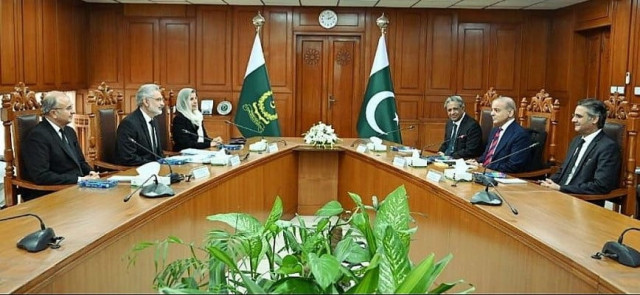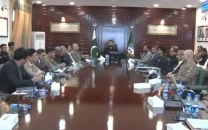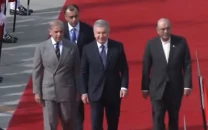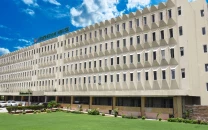SC endorses inquiry over judges’ letter
Govt to form commission led by retired judge

Despite facing strong reservations from some judges, the Supreme Court endorsed on Thursday a proposal for a commission led by a retired judge to inquire into the letter written by six Islamabad High Court (IHC) judges regarding alleged interference of agencies in judicial functions.
Meanwhile, Chief Justice Qazi Faez Isa unequivocally conveyed to Prime Minister Shehbaz Sharif that any interference by the executive in the affairs and judicial workings of judges would not be tolerated. He emphasized that under no circumstances would there be any compromise on the independence of the judiciary.
The chief justice and the senior puisne judge, Justice Syed Mansoor Ali Shah, told Prime Minister Shehbaz that the independence of judiciary was the foundational pillar that “upholds the rule of law and a strong democracy”.
Shehbaz, accompanied by Law Minister Azam Nazeer Tarar and Attorney General for Pakistan (AGP) Mansoor Awan, visited the Supreme Court on the desire of Chief Justice Isa to address the issue raised by the letter from the IHC judges. The meeting lasted for approximately one and a half hours.
During the discussion, it was proposed to establish an inquiry commission under the Pakistan Commissions of Inquiry Act, 2017, to be led by a retired judge of impeccable integrity to investigate the matter. Shehbaz pledged that a federal cabinet meeting would be convened to seek approval for the formation of the inquiry commission.
The prime minister endorsed the views expressed by the chief justice and the senior puisne judge and assured them that he would take appropriate measures to ensure independent judiciary, by issuing directions to the relevant departments, and initiating legislation in accordance with the paragraph 53 in Faizabad Dharna case judgment.
Later, the chief justice called a full court meeting and briefed the apex court judges on what transpired in the meeting with the prime minister. It was the second full court meeting of the Supreme Court in as many days.
Though the minutes of the full court meeting were yet to be issued, it is learnt that there was disagreement on the inquiry commission into this matter. Some judges opined that a commission by the federal government would affect the trichotomy of powers and independence of judiciary.
During the first full court meeting on Wednesday, it is further learnt, a few judges called these six IHC judges as heroes. According to an official statement, the full court deliberated on the issues raised in the judges’ letter.
It added that consensus was developed among the members of the full court that in view of the gravity of the situation, the chief justice might hold a meeting with the prime minister on the issues raised in the letter, the statement added.
Chief Justice Isa had received the letter from six IHC judges on March 26. In view of the gravity of the allegations levelled in the letter, he called a meeting on the same day with the chief justice and all the judges of the IHC at his residence and heard their concerns for over two and a half hours.
There is exemplary understanding among the judiciary, executive and superior bars during CJP Isa’s tenure. On Wednesday, he met with the Supreme Court Bar Association (SCBA) and the Pakistan Bar Council (PBC) representatives. The government functionaries are very relaxed as superior bars led by independent group are unlikely to oppose the formation of the inquiry commission.
However, representatives of the Professional Group are averse to the formation of an inquiry commission by the executive. The group is dominant in the Lahore High Court Bar Association (LHCBA) and the Balochistan Bar Council (BBC). The Islamabad High Court Bar Association (IHCBA) also backs the stance of the IHC judges.
PBC member Muneer Kakar, who belongs to the Professional Group, wondered as to how the Supreme Court could endorse the formation of the inquiry commission by the government which was the main beneficiary of political engineering that had been exposed in the judges’ letter.
Also read: Commission to probe 'letter controversy' after PM-CJP meeting
Kakar expressed the fears that after institutional response by Chief Justice Isa, no judge would dare reveal such incidents next time. Former additional attorney general Waqar Rana also said that a commission by the executive would go against the principle of separation of powers.
He emphasised that it would also go against the principle of natural justice because the executive would practically be the judge in its own cause. “Even, the meeting of the chief justice, along with the senior judge, with the chief executive is unprecedented and likely to undermine the independence of judiciary.”
Interestingly, the term of reference (TORs) of the inquiry commission would be formulated by the executive. There are reports that some judges wanted to take suo motu notice on the letter in order to give institutional response.
Former Sindh High Court Bar Association (SHCBA) president Salahuddin Ahmed said that given the gravity of the allegations and the fact that almost all IHC judges had been complaining of interference from intelligence agencies; merely forming a commission of Inquiry was not sufficient.
“It is not only a matter of utmost public importance but also the duty of the Supreme Court to ensure that all judges feel safe in performing their functions independently, and hence it was entirely appropriate for the Supreme Court to take up the matter suo motu,” Ahmed said.
“Given the past history of interference by intelligence agencies in judicial affairs and the complete impunity afforded to them even in cases where such interference has been admitted; expecting a mere commission [even if headed by a retired judge] to be able to do the needful is naive”, he added.
Now that the Supreme Court has agreed to the inquiry commission, there is no chance that judiciary will take up this matter on the judicial side. However some individual judges may give reaction to the commission. Even the six IHC judges could refuse to appear before the commission.
On the other hand, one section of the lawyers is lauding Chief Justice Isa for getting commitment from Prime Minister Shehbaz that he would be taking other appropriate measures to ensure an independent judiciary, including directions to the relevant departments, and initiating legislation in accordance with the Faizabad Dharna judgment in which 17 different directions were passed.
The judgement in 2019, authored by then Justice Isa, had directed that all the intelligence agencies, including the Inter-Services Intelligence (ISI), Intelligence Bureau (IB), the Military Intelligence (MI) and the Inter-Services Public Relations (ISPR) must not exceed their respective mandates.
It said that they could not curtail the freedom of speech and expression and did not have the authority to interfere with broadcast and publications, in the management of broadcasters and publishers and in the distribution of newspapers.
It is also directed that intelligence agencies should monitor activities of all those who threatened the territorial integrity of the country and all those who undermined the security of the people and the state by resorting to or inciting violence.
To best ensure transparency and the rule of law, it stressed, it would be appropriate to enact laws, which clearly stipulate the respective mandates of the intelligence agencies. The Constitution emphatically prohibits members of the armed forces from engaging in any kind of political activity, which includes supporting a political party, faction or individual.
“The government of Pakistan through the Ministry of Defence and the respective chiefs of the army, the navy and the air force are directed to initiate action against the personnel under their command who are found to have violated their oath,” the judgment had said.



















COMMENTS
Comments are moderated and generally will be posted if they are on-topic and not abusive.
For more information, please see our Comments FAQ